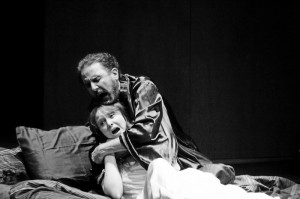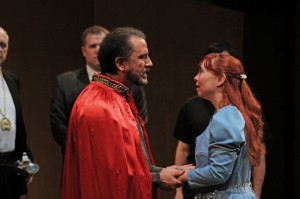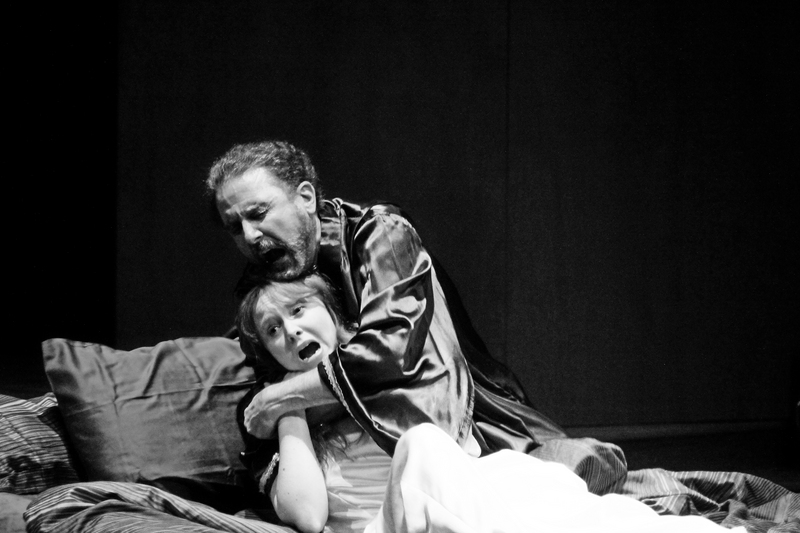
Louis Pangaro as Othello, Amy Rauch as Desdemona in Cedar Lane Stage's OTHELLO, running through March 11 in Bethesda, MD. (Photo credit: Gilded Lily Photography; www.gildedlilyphotography.weebly.com)
Walking into the upstairs space used by Cedar Lane Stage (CLS) at the Cedar Lane Unitarian Church makes you instantly aware that “something theatrical this way comes”. The long room with entire window walls on both sides directs your immediate attention to the large colorful double bed positioned on center stage. However, your eye then is drawn to the large carpeted area around which are arranged the seating levels. As I was guided (unintentionally but conveniently) into the space by the director, Ed Starr, I learned from him about the six (6) entrance/exits to be utilized to bring the action to the audience in this lengthy (3 hours) Shakespearean tragedy.
Starr does a creditable job with myriad difficult aspects of directing Shakespeare. This piece is language driven and the lack of action did cause attention drift. However, just when attention strayed, it was almost always recaptured by an entrance or an emotional response. The ensemble spoke and interpreted the language well; although some cameo characters with fewer years onstage experience needed to project for optimal audience understanding.
This production sadly closes the doors on Cedar Lane Stage theater after 50+ years of theatre. While providing this ‘swan song’ production for their community, Starr and CLS management used the talents of technicians who previously served CLS during its tenure to support this production. While the main floor acting area does not have theatrical lighting options, Rita Scheeler (Lighting Design) and Matt Pangaro (Lighting Technician) should be commended for using the minimal lighting instruments to make the scenes vary between the brightness of day and the warmth of castle interiors. To assist with the drama associated with the key death scene late in the play, Mother Nature stepped in with ragged and bright lightning strikes (from the nearby rainstorm) flashing outside. It was unplanned; but it was certainly additive! Sandy Eggleston (Costume Design) provided a motley costuming approach. To explain motley, there was a combination of modern clothing, i.e., work shoes and suits used primarily for the males together with period items (ladies’ gowns, capes and swords). The overall impact was jarring at first but after the initial surprise, the ease with which the characters used their costumes and how well they all fit together for color and scene texture became apparent.
The ensemble was engaging and appropriately emotional overall. It was apparent that Starr had worked with each actor to give them a specific persona and to ensure that that persona appeared on stage for both those in larger and smaller roles. The majority of this cast has performed Shakespeare before and their familiarity with the language and the structure of the verse made it that much easier for the audience to be bemused and then absorbed into the violence and hatred unfolding before them.

Louis Pangaro as Othello, Amy Rauch as Desdemona, (with Ted Taylor, Gary Wynn and Chris Tully in the background) in Cedar Lane Stage's OTHELLO. (Photo credit: Gilded Lily Photography; www.gildedlilyphotography.weebly.com)
Lou Pangaro as Othello was a regal warrior from his first appearance on stage. While raging is always problematical from a diction perspective, Pangaro moved easily vocally and physically from his soft-spoken lover, to his querulous questioning of Desdemona to his rage at his perceived betrayal. Kudos are due to Amy Rauch as Desdemona. It is hard work to maintain your innocent equilibrium while everyone around you swirls in avarice, ambition, hatred and fear. Rauch does an admirable job of keeping pace with Pangaro’s Othello.
Iago, played by Christopher Tully, easily convinces the audience of his hatred for Othello as he shares his rationale forcing the audience to tacitly sit by and watch as his destructive plans come to fruition. While switching from conniving villain to manipulative friend, Tully showed a smaller range of emotion than should be in evidence. Iago’s approach and the smoothness of the language used with Othello should vary more obviously from the raucous and cruel machinations Iago arranges with other conspirators.
Michelle Trout, as Iago’s wife, Emelia, performed solidly and supportively. Trout showed her depth of character with a small but wonderfully expressed monologue to Desdemona in the latter part of the play about being strong as the person you know you are.
Please see this Cedar Lane Stage production of OTHELLO. It is well worth the time and will leave you with a warm memory of the generosity of the cast, crew and management of Cedar Lane Stage.
OTHELLO
by William Shakespeare
Directed by Ed Starr
Cedar Lane Stage
Cedar Lane Unitarian Universalist Church
9601 Cedar Lane
Bethesda, MD 20814
http://www.cedarlanestage.org/
Photos courtesy of Gilded Lily Photography, www.gildedlilyphotography.weebly.com


